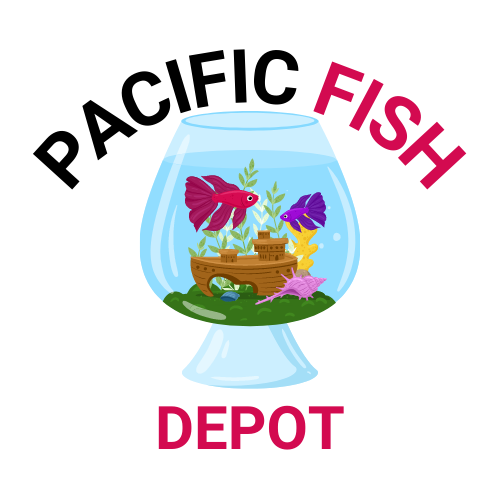No products in the cart.
Where to Buy Gold Head Cichlid
The Gold Head Cichlid, also known as Altolamprologus calvus “Gold Head”, is a remarkable variety of one of Lake Tanganyika’s most intriguing predatory cichlids. With its deep body, compressed profile, and metallic gold facial glow, this fish is admired both for its unusual body shape and regal coloration. A slow grower but long-lived species, the Gold Head Calvus is a showpiece for any Tanganyikan or specialty African cichlid aquarium.
Now available at Pacific Fish Depot, these fish are ethically sourced, carefully acclimated, and shipped with professional attention to health and handling.
A Unique Predator with Personality
Unlike more aggressive African cichlids, Gold Head Calvus are intelligent and relatively calm. Their narrow face and protruding mouth help them hunt by extracting prey from crevices between rocks. They are most active during feeding, but also enjoy exploring rockwork and caves.
With a body that can reach 5–6 inches in adulthood, these fish demand respect — not because they’re bullies, but because of their slow, deliberate, and commanding presence. Their shimmering gold head stands out under proper lighting and contrasts beautifully with their dark, patterned body.
Ideal Aquarium Conditions
Gold Head Cichlids are endemic to rocky, sediment-free zones in Lake Tanganyika, where they hide among cracks and vertical stone structures. Replicating this environment is key to their success in captivity.
Tank specifications:
Tank Size: 40 gallons minimum (55+ for adults or groups)
Temperature: 75–80°F (24–27°C)
pH: 8.0–9.0
Hardness: 10–20 dGH
Décor: Heavy rockwork, vertical caves, minimal plants
Substrate: Sand or fine crushed coral
These fish do not tolerate sudden changes in water chemistry. Use a high-quality African cichlid buffer to maintain alkalinity and stability.
Feeding Routine
Gold Head Calvus are micro-predators. In the wild, they feed on small crustaceans, insect larvae, and fry hiding in cracks. In aquariums, they adapt well to protein-rich foods.
Best food options:
Live or frozen brine shrimp
Mysis shrimp
Krill (chopped)
Cichlid sticks
High-protein pellets
Feeding should be done slowly — these cichlids are shy and deliberate eaters. Avoid floating flake foods or aggressive eaters in the same tank that could outcompete them.
Tank Mates and Compatibility
Gold Head Cichlids are semi-aggressive, but much of their demeanor depends on tank space and structure. They prefer their own territory and do not like to be crowded. That said, they can do well with other Tanganyikan species that occupy different niches.
Good tank mates include:
Cyprichromis species (open-water)
Shell dwellers (substrate)
Julidochromis or smaller rock dwellers (with care)
Peaceful Synodontis catfish
Avoid fast-moving or boisterous Mbuna, as they can stress the more passive Calvus.
Breeding Behavior
Though difficult to breed due to their slow maturation (up to 2 years), Gold Head Cichlids are substrate spawners. A bonded pair will choose a deep crevice to lay eggs. The female guards the eggs inside while the male patrols outside.
They exhibit exceptional parental behavior but will eat fry if they feel threatened. Breeding is best attempted in a species-dedicated tank with limited disturbance and lots of hiding places.
To explore scientific background and care notes, visit Seriously Fish’s Calvus profile.
Frequently Asked Questions
1. How big do Gold Head Cichlids get?
Adults reach 5–6 inches, though they grow slowly and may take up to two years to mature fully.
2. Are they aggressive?
They are territorial but not outwardly aggressive unless threatened. Proper tank mates and rock structures reduce tension.
3. What makes their “gold head” glow?
It’s a natural pigmentation that becomes more pronounced under proper lighting and as the fish matures.
4. Can I keep multiple Calvus together?
Only in large tanks (75+ gallons) with plenty of rockwork. Even then, watch for territorial disputes.
5. Do they need plants in the aquarium?
Plants are optional. These cichlids prefer hardscapes like rocks, and plants are often uprooted or ignored.












Reviews
There are no reviews yet.